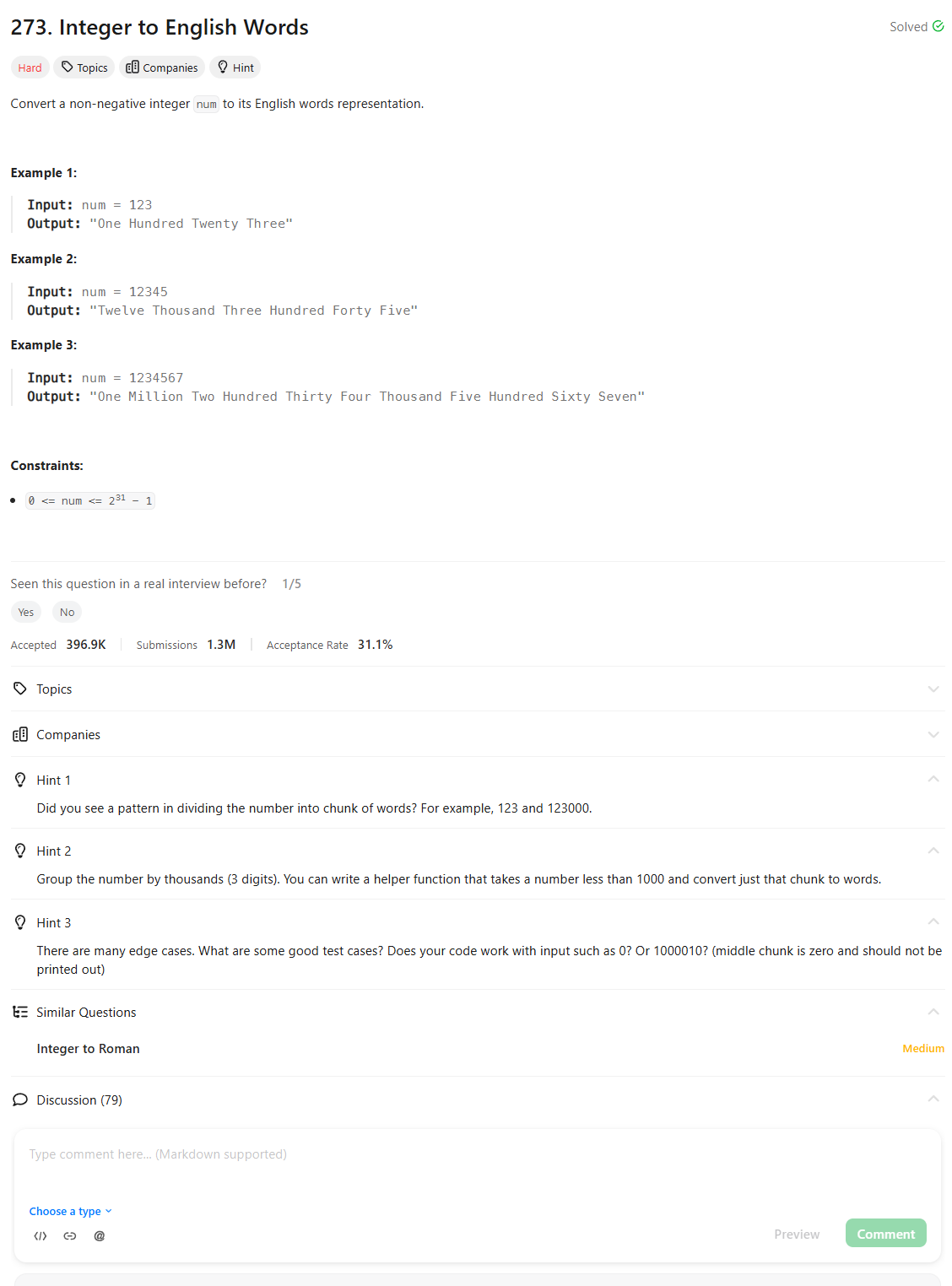Problem of The Day: Integer to English Words
Problem Statement

Notes:
- Need to review this problem
Editorial
Approach 1: Recursive Approach
class Solution:
# Arrays to store words for numbers less than 10, 20, and 100
below_ten = ["", "One", "Two", "Three", "Four", "Five", "Six", "Seven", "Eight", "Nine"]
below_twenty = ["Ten", "Eleven", "Twelve", "Thirteen", "Fourteen", "Fifteen", "Sixteen", "Seventeen", "Eighteen", "Nineteen"]
below_hundred = ["", "Ten", "Twenty", "Thirty", "Forty", "Fifty", "Sixty", "Seventy", "Eighty", "Ninety"]
# Main function to convert a number to English words
def numberToWords(self, num: int) -> str:
# Handle the special case where the number is zero
if num == 0:
return "Zero"
# Call the helper function to start the conversion
return self._convert_to_words(num)
# Recursive function to convert numbers to words
# Handles numbers based on their ranges: <10, <20, <100, <1000, <1000000, <1000000000, and >=1000000000
def _convert_to_words(self, num: int) -> str:
if num < 10:
return self.below_ten[num]
if num < 20:
return self.below_twenty[num - 10]
if num < 100:
return self.below_hundred[num // 10] + (" " + self._convert_to_words(num % 10) if num % 10 != 0 else "")
if num < 1000:
return self._convert_to_words(num // 100) + " Hundred" + (" " + self._convert_to_words(num % 100) if num % 100 != 0 else "")
if num < 1000000:
return self._convert_to_words(num // 1000) + " Thousand" + (" " + self._convert_to_words(num % 1000) if num % 1000 != 0 else "")
if num < 1000000000:
return self._convert_to_words(num // 1000000) + " Million" + (" " + self._convert_to_words(num % 1000000) if num % 1000000 != 0 else "")
return self._convert_to_words(num // 1000000000) + " Billion" + (" " + self._convert_to_words(num % 1000000000) if num % 1000000000 != 0 else "")
Approach 2: Iterative Approach
class Solution:
def numberToWords(self, num: int) -> str:
# Handle the special case where the number is zero
if num == 0:
return "Zero"
# Arrays to store words for single digits, tens, and thousands
ones = ["", "One", "Two", "Three", "Four", "Five", "Six", "Seven", "Eight", "Nine", "Ten", "Eleven", "Twelve", "Thirteen", "Fourteen", "Fifteen", "Sixteen", "Seventeen", "Eighteen", "Nineteen"]
tens = ["", "", "Twenty", "Thirty", "Forty", "Fifty", "Sixty", "Seventy", "Eighty", "Ninety"]
thousands = ["", "Thousand", "Million", "Billion"]
# StringBuilder to accumulate the result
result = ""
group_index = 0
# Process the number in chunks of 1000
while num > 0:
# Process the last three digits
if num % 1000 != 0:
group_result = ""
part = num % 1000
# Handle hundreds
if part >= 100:
group_result += ones[part // 100] + " Hundred "
part %= 100
# Handle tens and units
if part >= 20:
group_result += tens[part // 10] + " "
part %= 10
# Handle units
if part > 0:
group_result += ones[part] + " "
# Append the scale (thousand, million, billion) for the current group
group_result += thousands[group_index] + " "
# Insert the group result at the beginning of the final result
result = group_result + result
# Move to the next chunk of 1000
num //= 1000
group_index += 1
return result.strip()
Approach 3: Pair-Based Approach
class Solution:
# Dictionary to store words for numbers
number_to_words_map = {
1000000000: "Billion", 1000000: "Million", 1000: "Thousand",
100: "Hundred", 90: "Ninety", 80: "Eighty", 70: "Seventy",
60: "Sixty", 50: "Fifty", 40: "Forty", 30: "Thirty",
20: "Twenty", 19: "Nineteen", 18: "Eighteen", 17: "Seventeen",
16: "Sixteen", 15: "Fifteen", 14: "Fourteen", 13: "Thirteen",
12: "Twelve", 11: "Eleven", 10: "Ten", 9: "Nine", 8: "Eight",
7: "Seven", 6: "Six", 5: "Five", 4: "Four", 3: "Three",
2: "Two", 1: "One"
}
def numberToWords(self, num: int) -> str:
if num == 0:
return "Zero"
for value, word in self.number_to_words_map.items():
# Check if the number is greater than or equal to the current unit
if num >= value:
# Convert the quotient to words if the current unit is 100 or greater
prefix = (self.numberToWords(num // value) + " ") if num >= 100 else ""
# Get the word for the current unit
unit = word
# Convert the remainder to words if it's not zero
suffix = "" if num % value == 0 else " " + self.numberToWords(num % value)
return prefix + unit + suffix
return ""